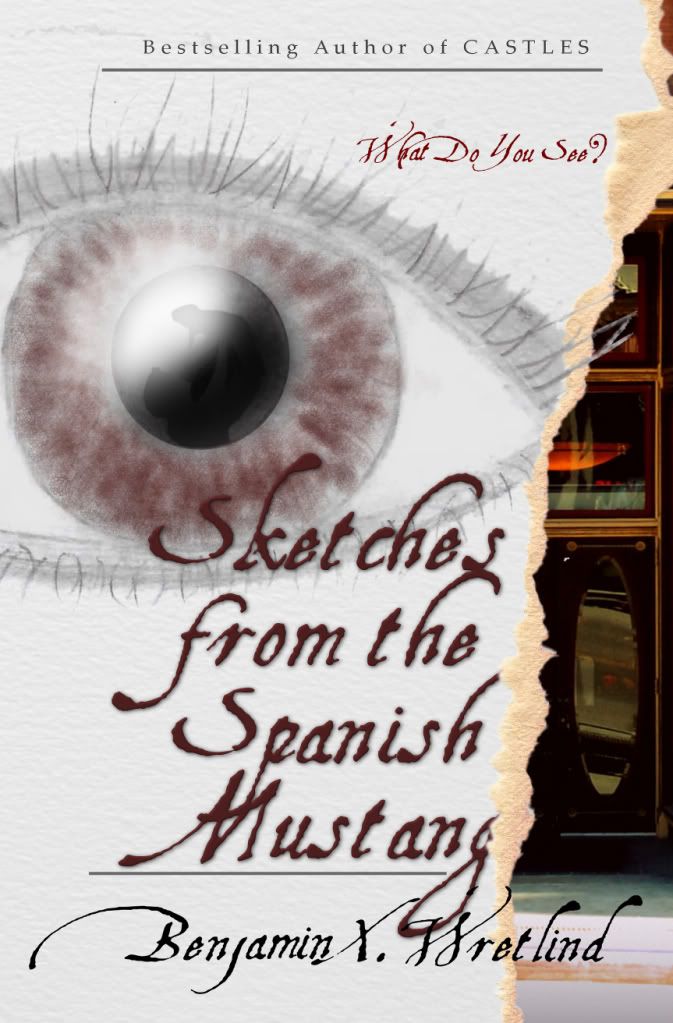Theme.
In contemporary literary studies, a theme is the central topic, subject, or concept the author is trying to point out, not to be confused with whatever message, moral, or commentary it may send or be interpreted as sending regarding said concept (i.e., its inferred "thesis").
Blah, blah, blah. When I wrote my first few novels, I had no idea what the theme was when I started; I just wanted to tell a freakin' story. If a theme fell out of that story, so be it, but I didn't want to "point out" something to the world. Even more telling, I refused to tell a "message, moral, or commentary." That would be foolish.
Castles: A Fictional Memoir of a Girl with Scissors didn't start with a theme or moral. What I ended up with was "Is madness heredity, environmental or both?" Likewise, Sketches from the Spanish Mustang was orignally going to be a collection of stories with no central theme. However, as I wrote, Thomas Tweed, one of the characters, kept telling me to look at him with different eyes.
Bingo. Theme.
I recently started to plot and flesh out my next work, a "literary thriller" (there's that word, again) about three brothers. An idea formed, however, that I could say something, could possibly even begin with a theme and write the story around it. That theme (or moral, even) came to light when a friend of mine was killed in Afghanistan just days before Osama bin Laden was killed.
So I had a quandry: can I write a story based on a theme/moral, or should I just shut up and color?
I thought about this for a while. I made more notes. I even wrote out some basic ideas of a theme or a moral to the story.
I guess I still don't have any answers. The novel is, again, literary, so I want to say something. The story begs me to say it, and the more I flesh it out, the more the theme and the moral become apparent.
But is this the right way to do things?
I don't know, which I while I titled this post: "Should Theme Come First?" In reality, the authors out there have different opinions. Some think you should just tell a story. Some think stories will eventually form a theme. Some set out at the beginning to say something and the theme is apparent from page one.
I guess that really answers my question, doesn't it? Theme (and moral) should be up to author, especially Indie authors who don't wear chains and have an obligation to "git 'er done" in whatever fashion they see fit.
I'm an Indie author. This upcoming novel (which I'll talk about on Jason Gleason's blog tomorrow) will be written around a theme. It'll be new for me, but I'll learn something: it'll work or it won't.
Are you an author? What do you think?
BIOGRAPHY
Benjamin X. Wretlind, the author of Castles: A Fictional Memoir of a Girl with Scissors and Sketches from the Spanish Mustang, has been called "a Pulitzer-caliber writer" with "a unique American voice." Aside from novels, he has been published in many magazines throughout the past 10 years.
SKETCHES FROM THE SPANISH MUSTANG
In Sketches from the Spanish Mustang, a haunting, heart-warming and often brutally direct exploration of the lives of seven people in the mining town of Cripple Creek, Colorado, a woman must come to grips with the failings that cost the lives of her husband and child. Bestselling author Michael K. Rose says: "Mr. Wretlind has penned a tale of such emotional and literary depth it will haunt the reader long after the last page is turned."
With a pencil, a sketchbook and a keen eye for the details of the soul, the woman's lines and smudges, curves and tone reveal the stories behind her subjects. Life emerges on the page — vengeance, salvation, love and death. The artist's subjects fight for survival, only to be saved in the sketches of a woman with a gift . . . and a curse.
International Book Award winner Gregory G. Allen calls the book a "unique journey that rips away the outer layers of people allowing us to stare into their souls where humanity is universal: no matter the genre of writing."
Sketches from the Spanish Mustang is available at all major online retailers for $14.95. It is also presented in an electronic format (e.g. Kindle, nook) for $5.95.


